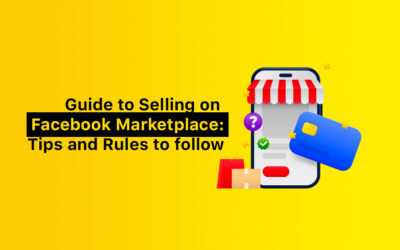In today’s digital landscape, affiliate marketing stands tall as a potent avenue for individuals and businesses alike to generate additional income. Whether you aspire to become an affiliate marketer promoting trusted brands or wish to launch your own affiliate program, the world of affiliate marketing offers a wealth of opportunities waiting to be explored.
Affiliate marketing operates on a win-win principle. Brands benefit by gaining trusted referrals from relevant creators and access to untapped audiences. In return, affiliates and content creators earn commissions on sales or other specified marketing actions triggered by their affiliate links.
This comprehensive guide will walk you through the process of becoming an affiliate marketer who promotes external brands.
We will also delve into how to initiate your journey towards earning through affiliate marketing, provide online marketing tips to establish a thriving affiliate program, and share best practices to maximise your earnings.
Table of Contents:
- Understanding Affiliate Marketing
- The Mechanics of Affiliate Marketing
- Exploring the Diverse Types of Affiliate Programs
- Pros and Cons of Affiliate Marketing
- Unveiling the Strategies for Earning as an Affiliate Marketer
- Embarking on Your Affiliate Journey: A Step-by-Step Guide
- Tips for Achieving Success in Affiliate Marketing
- Start Your Affiliate Marketing Venture Today
Understanding Affiliate Marketing
At its core, affiliate marketing is a process where content creators or publishers earn commissions by endorsing products or services offered by retailers or advertisers. The affiliate marketer receives compensation for delivering specific results to the retailer or advertiser, facilitated through tracked affiliate links used for promoting the product or service.
Traditionally, affiliates are rewarded for driving sales. However, certain affiliate programs may compensate you for generating leads, attracting free-trial users, directing clicks to a website, or encouraging app downloads.
Affiliate networks, represented by websites, serve as connectors, linking creators, and influencers with various brands’ affiliate programs. Remarkably, many affiliate programs are free to join. When executed effectively, affiliate marketing can evolve from a side hustle into a lucrative online business model that generates passive income.

The Mechanics of Affiliate Marketing
Affiliate programs operate by enabling individuals or businesses (affiliates) to endorse and sell a company’s products or services in exchange for a commission on each sale. Affiliates earn commissions whenever someone makes a purchase by clicking on their unique affiliate link associated with their recommendation.
Here’s a simplified breakdown of how affiliate marketing works:
- An affiliate showcases an advertisement or link for a particular store (e.g., Store Z) on their website, blog, or social network.
- A potential customer clicks the unique affiliate link.
- The customer makes a purchase from Store Z.
- The affiliate network records the transaction.
- Store Z confirms the purchase.
- The affiliate receives a monetary commission.
Commission rates for affiliate sales can vary significantly, depending on the company and the specific offer. While some affiliate marketers may earn around 5% of the sale, others can secure commissions as high as 50%, particularly with high-ticket affiliate programs. Certain affiliate programs offer a fixed rate per sale instead of a percentage.
Exploring the Diverse Types of Affiliate Marketing
Affiliate marketer Pat Flynn classifies affiliate’s marketing into three categories, each with its unique characteristics:
Unattached Marketing: In this type, affiliates lack authority in the niche of the product they promote. They rely on methods like pay-per-click (PPC) advertising campaigns, where they hope people will click on the affiliate link and make purchases. Unattached affiliate marketing is favored by those seeking income without significant effort but lacks the trust and relationship-building aspect.
Related Marketing: This approach involves promoting products or services related to your niche, even if you don’t personally use them. Influencers and content creators who have established audiences are trusted sources for product recommendations, even if they haven’t personally experienced the products. However, this approach carries the risk of endorsing items you haven’t tested, potentially damaging your credibility.
Involved Marketing: This type revolves around endorsing products and services that you’ve genuinely used and believe in. It emphasizes trust and authenticity, aiming to benefit both your audience and your business. While it requires more time to build credibility, it’s essential for establishing a sustainable affiliate marketing venture.
Pros and Cons of Affiliate Marketing
The affiliate marketing industry, valued at $8.2 billion in 2022, continues to flourish as an attractive marketing strategy for businesses. For creators, it serves as a low-cost or no-cost endeavor with immense profit potential. However, before venturing into affiliate programs, it’s vital to consider its pros and cons.
Affiliate Marketing Pros:
Ease of Execution: Affiliate marketing primarily focuses on the digital marketing aspect, eliminating the need to handle product development, support, or fulfilment.
Low Risk: Joining an affiliate program usually incurs no initial costs. Once you’ve cultivated an audience, you can commence earnings through established affiliate products or services without additional investment. This potential for relatively passive income is a significant advantage.
Scalability: Successful affiliate program allows for substantial income scaling without requiring additional personnel. You can introduce new products to your existing audience while your previous efforts continue to generate affiliate revenue in the background.
However, it’s crucial to remember that affiliate marketing’s effectiveness is grounded in trust. While numerous products and services are available for promotion, focusing on those you genuinely use and endorse is the key to becoming an exceptional affiliate marketer.
Affiliate Marketing Cons:
Requires Patience: It is not a get-rich-quick scheme; it demands time and patience to develop an audience and establish influence.
Commission-Based: Affiliate-marketing programs typically operate on a commission basis, with earnings tied to specific actions like leads, clicks, or sales. There’s no guaranteed weekly paycheck, making consistent income unpredictable.
Limited Control: Affiliates must adhere to the rules set by the company offering the affiliate program, including guidelines on content presentation and promotion. This can limit creative freedom and differentiation among competitors.
Strategies for Earning as an Affiliate Marketer
Affiliate marketing income spans a wide spectrum, with some affiliates earning a few hundred dollars monthly and others securing six-figure annual incomes. The potential income correlates with the size of your following, making it essential to build and engage your audience effectively. Learn more about stats.
Various compensation models exist within affiliate marketing, such as:
Pay Per Sale: Earning a commission for each sale generated through your affiliate link. Commonly used in e-commerce offers.
Pay Per Action: Receiving a commission for specific actions, including newsletter signups, clicks, contact requests, or form submissions. Versatile and applicable to various offers.
Pay Per Install: Earning income for every installation generated from your website traffic, usually associated with promoting mobile apps and software.
Pay Per Lead: Earning commissions each time someone signs up for something, prevalent in sweepstakes, lead generation, and similar offers. Particularly suitable for beginners.
Pay Per Click: Earning commission for every click on your affiliate link. Rarely used, primarily by larger merchants to build brand awareness.
Embarking on Your Affiliate Marketing Journey: A Step-by-Step Guide
Starting your affiliate venture is akin to launching a small business, demanding dedication and discipline. Follow this step-by-step guide to initiate your affiliate marketing journey:
-
Pick Your Platform and Method:
Choose the platform where you’ll cultivate your audience. Affiliate marketers employ various approaches and platforms, including niche-focused websites, digital content creation (blogging, YouTube, social media), or even hosting courses, events, and workshops. Opt for a platform that aligns with your comfort and expertise.
-
Determine Your Niche and Audience:
Select a niche you are passionate about and knowledgeable in. Your niche should resonate with your target audience, and you should genuinely endorse the products or brands you intend to promote.
-
Find Your Products:
Identify products or services that your audience genuinely desires. Numerous affiliate networks and marketplaces exist, such as Affiliate Future, CJ, ClickBank, and ShareASale, offering a plethora of options. Alternatively, approach the creators or sellers of products you admire to explore potential affiliate partnerships.
-
Choose Your First Affiliate Program:
Ensure that the product or service you intend to promote aligns with your brand and income goals. Select an affiliate program that resonates with your audience and expertise.
Tips for Achieving Success in Affiliate Marketing
Success in marketing of affiliate hinges on several key factors. Implement these tips to maximize your affiliate journey:
- Build Trust:
If you’re offering personal reviews or recommendations, provide candid opinions based on your experience and knowledge. Authenticity and trust are paramount for gaining your audience’s confidence and encouraging them to act on your recommendations.
- Talk to a Product Expert:
Consider interviewing product users, experts, or even the creators themselves to enrich your reviews and recommendations.
- Create Product Tutorials:
Offer tutorials that showcase the value and functionality of the products you endorse. Addressing specific problems and demonstrating solutions can significantly impact your audience’s purchasing decisions.
- Build an Email List:
Establishing an email list is crucial for connecting with your audience beyond social media platforms. Email marketing boasts the highest conversion rate among marketing channels.
- Find Relevant Search Terms:
Optimize your content for search engines by identifying keywords that potential customers might use when seeking solutions related to your promoted products.
- Consider Your Angle:
Tailor your content strategy to align with your affiliate products. Share your personal experiences, unbox products, or create content that organically introduces niche items to your audience.
- Set Your Distribution Strategy:
Effectively share your promotional content through your website, social media, or email marketing. Maintain an affiliate marketing hub on your website for easy access to affiliate resources.
- Try Offering a Bonus:
Sweeten the deal by offering bonuses, such as free e-books or exclusive discounts, to customers who make purchases through your affiliate links.
- Keep Things Legal and Transparent:
Always disclose to your followers that your content contains affiliate links, adhering to FTC regulations. Transparency builds trust with your audience.
Start Your Affiliate Marketing Venture Today
Affiliate marketing presents a remarkable opportunity to add a new revenue stream to your financial portfolio, requiring little to no upfront investment. Although it demands time and effort to achieve mastery, affiliate marketing can evolve into a sustainable source of passive income over the years.
Become QPe Affiliate
Are you an affiliate marketer searching for a dynamic and lucrative program that offers boundless opportunities in the realm of e-commerce? Look no further than the QPe Affiliate Program.
Its unique features and offerings make it a standout choice for affiliates seeking to capitalise on the booming e-commerce industry. Help entrepreneurs to sell online by sharing about QPe with them.
How Does the QPe Affiliate Program Work?
Participating in the QPe Affiliate Program is straightforward and rewarding. Here’s a simplified overview of how it operates:
Enroll: Begin your journey by enrolling in the QPe Affiliate Program. The registration process is user-friendly and designed to get you started quickly.
Access Marketing Materials: Once you gain approval as a QPe affiliate, you’ll gain access to an extensive library of marketing materials, including banners, videos, articles, and more.
Promote QPe: Utilize the provided marketing materials to promote the QPe platform through your preferred channels. Whether it’s your website, blog, social media platforms, or email newsletters, you have the flexibility to reach your audience effectively.
Earn Commissions: As customers sign up for QPe services through your affiliate links and referrals, you’ll earn commissions based on the conversions generated. QPe ensures timely and transparent commission payments to its affiliates.
Track and Optimize: Keep an eye on your affiliate performance through an intuitive dashboard. Real-time insights into clicks, conversions, and earnings empower you to optimize your strategy for maximum success.
Maximize Earnings: Continuously refine your marketing strategy to maximize your earnings potential. Experiment with different approaches, and leverage the support and guidance provided by the QPe Affiliate Program team.
Visit the link to know more about QPe’s Affiliate Marketing Program.
As you embark on your affiliate marketing journey, remember that authenticity and audience engagement are your most potent assets. By offering value, building trust, and aligning with products that resonate with your audience, you can navigate the affiliate programs landscape and unlock its full earning potential in 2023.




